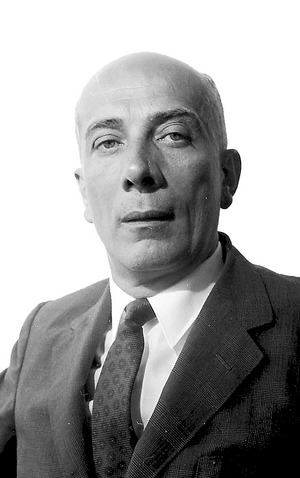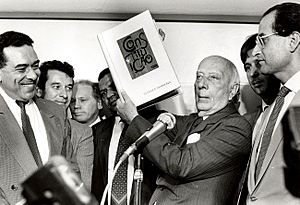Ulysses Guimarães facts for kids
Quick facts for kids
Ulysses Guimarães
|
|
|---|---|
 |
|
| President of the Chamber of Deputies | |
| In office 28 February 1985 – 15 February 1989 |
|
| Preceded by | Flávio Marcílio |
| Succeeded by | Paes de Andrade |
| In office 11 March 1956 – 11 March 1958 |
|
| Preceded by | Flores da Cunha |
| Succeeded by | Ranieri Mazzilli |
| Minister of Industry and Trade | |
| In office 8 September 1961 – 18 September 1962 |
|
| President | João Goulart |
| Prime Minister | Tancredo Neves Brochado da Rocha |
| Preceded by | Artur Bernardes Filho |
| Succeeded by | Dias Carneiro |
| Member of the Chamber of Deputies | |
| In office 26 June 1962 – 12 October 1992 |
|
| Constituency | São Paulo |
| In office 11 March 1951 – 11 September 1961 |
|
| Constituency | São Paulo |
| Member of the Legislative Assembly of São Paulo | |
| In office 14 March 1947 – 11 March 1951 |
|
| Constituency | At-large |
| Born |
Ulysses Silveira Guimarães
6 October 1916 Itirapina, São Paulo, First Brazilian Republic
|
| Disappeared | 12 October 1992 (aged 76) Angra dos Reis, Rio de Janeiro, Brazil |
| Status | Missing for 33 years, 3 months and 30 days; declared dead in absentia on 12 October 1992 (aged 76) |
| Alma mater | Law School, University of São Paulo (BSS) |
| Occupation | Lawyer, politician, professor |
| Political party |
|
| Spouse(s) | Ida de Almeida Guimarães |
| Signature | |
 |
|
Ulysses Silveira Guimarães (October 6, 1916 – October 12, 1992) was an important Brazilian politician and lawyer. He played a key role in opposing the military dictatorship in Brazil and helping Brazil become a democracy again. He passed away in a helicopter accident near Angra dos Reis, in the south of Rio de Janeiro state.
Contents
About Ulysses Guimarães
Early Life and Education
Ulysses Silveira Guimarães was born in Itaqueri da Serra, a village now part of Itirapina, São Paulo State. He was very active during his time at university. He was involved with the August XI Academic Center and was vice president of the União Nacional dos Estudantes (National Students Union). Guimarães studied Law and Social Sciences at the Law School of the University of São Paulo (USP).
Career and Public Service
For many years, Ulysses Guimarães was a teacher at the Mackenzie University Law School. He became a professor of Public International Law there. He also taught Municipal Law and Constitutional Law at other law schools. He was an expert in Tax Law.
Before his political career, Guimarães worked for Santos Futebol Clube, a famous soccer team. He started in 1941 and became chief executive of the club's offices in São Paulo city in 1942 and again in 1945. In 1944, he was elected vice president of the club.
His political journey began when he was elected as a state deputy for São Paulo in 1947. He was part of the Social Democratic Party (PSD). After that, he was elected as a federal deputy for São Paulo for eleven terms in a row, from 1951 until his death in 1992.
Guimarães also served as the Minister of Industry and Trade from 1961 to 1962. This was during a short period when Brazil had a parliamentary system of government.
Opposing the Military Government
At first, Guimarães supported the military government that took power in 1964. However, he soon became a strong opponent. When the government created a two-party system in 1965, he joined the Brazilian Democratic Movement (MDB), which was the main opposition party. He later became its president. From 1967 to 1970, he was the president of the Latin American Parliament.
In 1973, Guimarães ran for president in the 1974 Brazilian presidential election. This was a symbolic act of protest against the military government. He knew he couldn't win because the president was chosen by Congress, and the military's party had most of the votes. Still, it was the first time the MDB had put forward a candidate during the military era. He received 76 votes, while the military's candidate, Ernesto Geisel, won easily.
In 1976, he founded the Order of Parliamentarians of Brazil (OPB). He led many campaigns to bring democracy back to Brazil, including the fight for a broad amnesty, which meant forgiving people who had been punished by the military government. When the two-party system ended in 1979, the MDB became the Brazilian Democratic Movement Party (PMDB), and he continued as its national president.
Leading the Return to Democracy
Ulysses Guimarães, along with other leaders like Tancredo Neves, helped lead campaigns for direct elections. This movement was very popular and known by the slogan: Diretas Já (Direct Elections Now).
In 1985, Guimarães was almost the PMDB's candidate for president. At that time, the president was still chosen by an electoral college, not by direct vote. Eventually, a "mixed" ticket was formed with Tancredo Neves as the presidential candidate and José Sarney as his running mate. This ticket won the election.
However, Tancredo Neves became very ill before he could take office. Some politicians thought Guimarães, who was the President of the Chamber of Deputies, should become acting president. But Guimarães himself argued that José Sarney, as the vice president-elect, should take over. Sarney became acting president and then officially president after Neves passed away.
Guimarães served as the President of the Chamber of Deputies three times (1956-1958, 1985-1987, and 1987–1989). He led the 1988 Constituent Assembly from 1987 to 1988. This assembly wrote Brazil's new constitution, which was officially announced on October 5, 1988. Guimarães called it the "Citizen Constitution" because it included many new social rights.
Because he was so popular, he ran for president for the PMDB in the 1989 direct elections. However, he lost to Fernando Collor.
Passing Away
Ulysses Guimarães died in a helicopter crash off the coast of Angra dos Reis, in Rio de Janeiro, on October 12, 1992. His wife, D. Mora, former Senator Severo Gomes, his wife, and the pilot were also on board. Guimarães's body was never found.
Books and Writings
- Vida Exemplar de Prudente de Morais, 1940
- Navegar é preciso, Viver não é preciso, 1973
- Socialização do Direito, 1978
- Esperança e Mudança, 1982
- Tentativa, 1983
- Diretas Já, 1984
- PT Saudações, 1988
- Da Fé fiz Companheira, 1989
- Ou Mudamos ou seremos Mudados, 1991
- Parliamentarismo – Além de ser mais forte, substitui um regime fraco, fevereiro de 1992.
Images for kids
See also
 In Spanish: Ulysses Guimarães para niños
In Spanish: Ulysses Guimarães para niños
 | Delilah Pierce |
 | Gordon Parks |
 | Augusta Savage |
 | Charles Ethan Porter |


